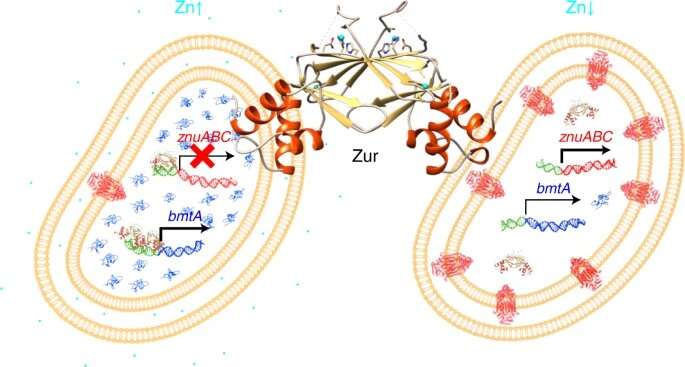Credit: Claudia Blindauer et al.
Marine cyanobacteria (blue-green algae) are major contributors to the global carbon cycle and are the basis of the food web in many of the world's oceans. They only require sunlight, carbon dioxide, plus a panel of essential elements, including metals, to sustain life. However, little is known about whether and how cyanobacteria utilize or regulate zinc, an element often considered to be essential to life.
An interdisciplinary research team including four members from the University of Warwick has identified a remarkably efficient regulatory network that controls zinc accumulation in the open ocean cyanobacterium Synechococcus.
The discovery is set out in a paper published today in Nature Chemical Biology.
This network allows Synechococcus to vary their internal zinc levels by over two orders of magnitude, and relies on a zinc uptake regulator protein (Zur) which can sense zinc and respond accordingly.
Uniquely, this sensor protein activates a bacterial metallothionein (zinc-binding protein) which, together with highly efficient uptake systems, is responsible for the extraordinary capacity of this organism to accumulate zinc.
Professor Claudia Blindauer from Warwick's Department of Chemistry noted that their "findings indicate that zinc is an essential element for marine cyanobacteria. Their ability to store zinc may facilitate enhanced phosphorus scavenging, a macronutrient that is extremely scarce in many regions of the world's oceans. Zinc may also be required for efficient carbon fixation."
Dr. Alevtina Mikhaylina from Warwick's School of Life Sciences commented that "these features, not yet reported for any other bacterium, likely contribute to the broad ecological distribution of Synechococcus across the global oceans. We hope our findings will be of interest to a broad range of researchers, from biochemists (particularly trace metal and bio-inorganic chemists), structural biologists and molecular biologists through to biogeochemists, microbial ecologists, and oceanographers."
Dr. Rachael Wilkinson, from Swansea University's Medical School, and Professor Vilmos Fülöp, from Warwick's School of Life Sciences, added that "as part of an interdisciplinary project, the structure of the Zur protein has offered mechanistic insights into how it performs its pivotal role in regulating zinc homeostasis in marine cyanobacteria."
Dr. James Coverdale, from the Institute of Clinical Sciences, University of Birmingham, observed that "working at the interfaces of microbiology, analytical, structural, and biological chemistry, our interdisciplinary team has considerably improved our understanding into how inorganic chemistry impacts life in our oceans."
Professor Dave Scanlan, from Warwick's School of Life Sciences, added that "the oceans are the somewhat overlooked 'lungs' of our planet—every other breath we take is oxygen evolved from marine systems whilst around a half of the carbon dioxide fixed into biomass on Earth occurs in ocean waters. Marine cyanobacteria are key players in Earth's 'lungs' and this manuscript reveals a novel aspect of their biology, namely the ability to exquisitely regulate zinc homeostasis, a feature that has undoubtedly contributed to their ability to fulfill these key planetary functions."
More information: Claudia Blindauer et al, A single sensor controls large variations in zinc quotas in a marine cyanobacterium, Nature Chemical Biology (2022). DOI: 10.1038/s41589-022-01051-1
Journal information: Nature Chemical Biology
Provided by University of Warwick
























